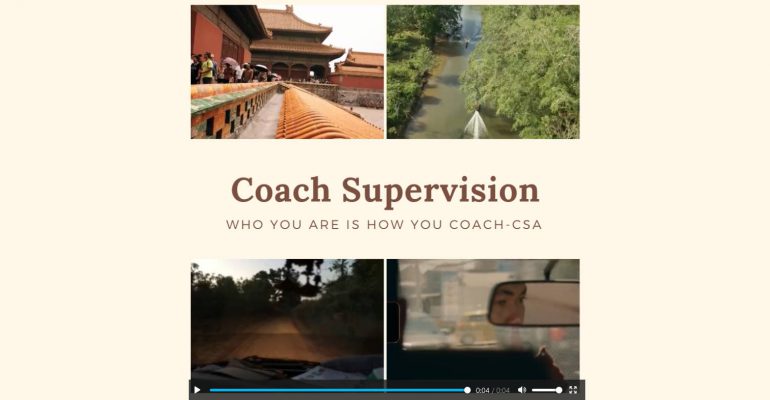What is Coaching Supervision?
July 17, 2020 2025-06-06 10:07What is Coaching Supervision?
What is Coaching Supervision?
Supervision is the interaction that occurs when a mentor or coach brings their coaching or mentoring work experiences to a supervisor in order to be supported and to engage in reflective dialogue and collaborative learning for the development and benefit of the mentor or coach, their clients and their organisations.
EMCC (European Mentoring and Coaching Council)
Purpose of Mentoring is to focus and give feedback on Coaching skills. Mentoring focus on immediate need to focus on improving skills through mentor’s experience. It is a feedback process for coaches to improve their coaching skills.
While Supervision is a systemic approach that has a broader scope which includes:
- Developmental :Concerned with development of skills, understanding and capacities of the coach / mentor.
- Resourcing :Providing a supportive space for the coach / mentor to process the experiences they have had when working with clients.
- Qualitative :Concerned with quality, work standards and ethical integrity.
Benefits of Supervision for Organisations
Organisations engaged with Coaches can ensure Quality and Ethics of Coaching delivered in their organisation. This directly contributes to organisation’s agenda.
Benefits of Supervision for Coaches
Coaches can grow themselves to enhance the client experience. Coaching supervision is a learning opportunity that
- Provides psychological safety to coaches to share their practice and thoughts
- Improves delivery and confidence of coaches for higher impact to clients
- Examines blind spots and coaching ‘best practices’
- Creates ‘learning environments’ and uncovers systemic issues, both in coaches and in the consultancies and organisations where coaching is offered.
The outcome is coaches develop a more in-depth self-awareness, enhancing both the coach’s and the client’s experience.
Role of Supervisor
- Manage the process and contracting
- Provide a safe space for reflection
- Ask for your feedback regularly
- Treat all interactions with the utmost confidentiality.
- Provide Support for Self-Development
- Manage Group Dynamics
- Demonstrate Self-Awareness
- Leverage expertise to support Coaches go deeper in their sub-conscious
- Enables ethical and professional behaviours
Role of Supervisee
- Bring real problems, questions and issues and be prepared for supervision.
- Be willing to share openly your experiences, mistakes, hopes and fears that arise from the process of coaching.
- Recognise that attention is given to the process, feelings and relationships as well as the content.
- Provide open and timely feedback to your supervisor at any time
- Be aware of the group dynamics and support each other
- Be mindful of the contracts with your end clients
Spectrum of Skills of Supervisors
Conceptual tools include:
- Karpman & TED triangle
- The seven-eyed model of supervision
- Transpersonal psychology
- Relational psychology
- Organizational psychology
- Building the internal supervisor
- Advanced dialogue process
- Neuro-cardiology and learning
- Gestalt processes
- Working with the unconscious
Meta skills include:
- Developing presence
- Understanding energy
- Reflective learning
- Accessing intuition
- Field theory
- Advanced dialogue process
- Systemic thinking
- Mindfulness
- Clean Language – working with voice, image and metaphor
- Creativity in supervision
Supervision draws on adult learning theory, systems theory, the art of reflection, mindfulness, relational psychology, neuroscience, advanced dialogue process, psychology, spirituality and more.
What does the coaches say about supervision?
Key Insights of some of the coaches
‘Reflective Inquiry using deep empathy. Suggested my client to reach out to those stakeholders who he feels safe , but never connected personally. Made a check every two days to gather feedback on the targeted outreach. He started having deeper connect to question his own limiting belief’
‘Through the various insights and questions that were asked in the session both about my client and me , the one thing that I found really meaningful was to evaluate – Who was I being in the engagement with her and how was I treating myself in that engagement and generally’
‘That with the client, I was also feeling her exhaustion and in turn getting this feeling of being stuck on what more I can do to help her. And once, I was able to separate my feelings from the situation, I could see that as a coach my responsibility is to pull the client out of the rabbit hole not to dive in with her into the hole!’
‘That at times I get attached to outcomes. I think it has to do with the standards one sets for oneself. I recognised that my coachee was probably experiencing the same thing in the world outside as in the coaching session and that I need to make him feel more safe so that he can open up completely’



